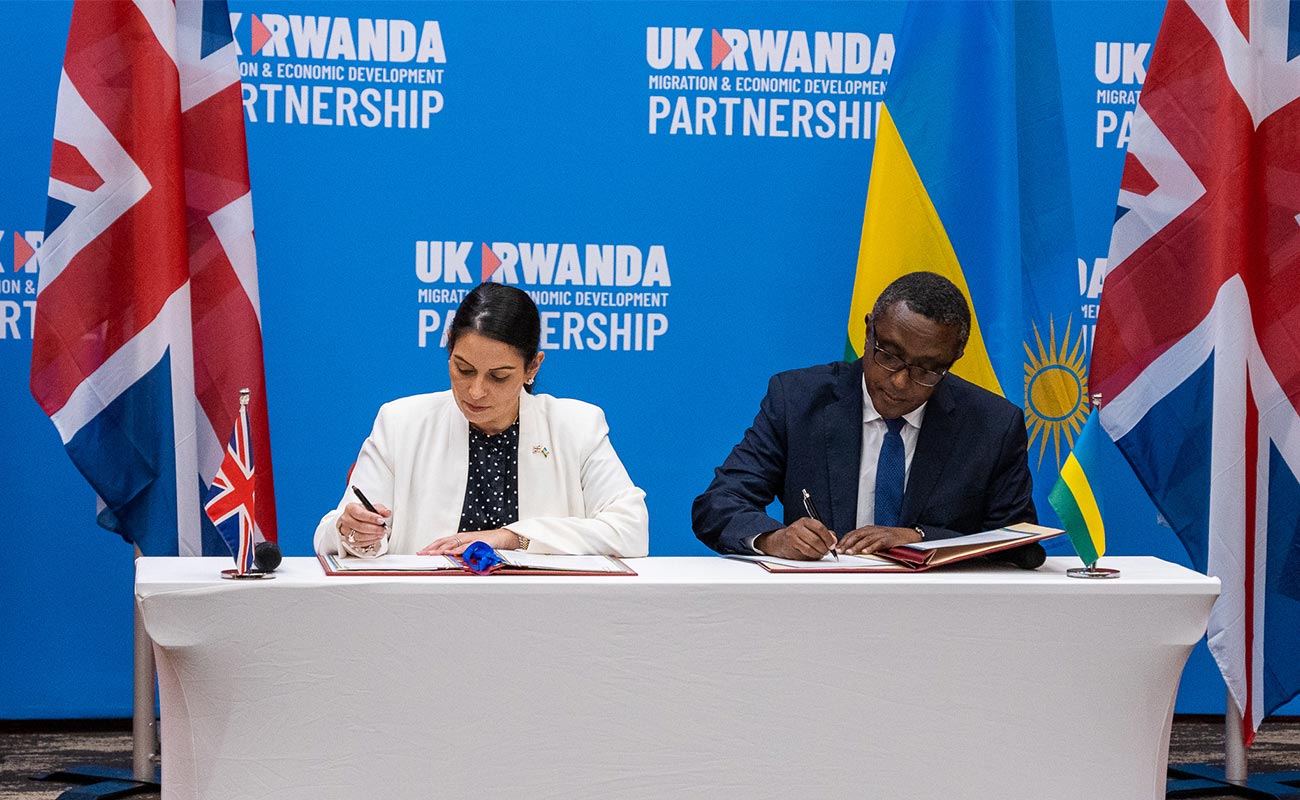
By Oluwaseun Taiwo
The U.K – Rwanda asylum deal aims to relocate asylum seekers from the U.K. to Rwanda for processing, with the goal of discouraging irregular migration. However, it has faced criticism from human rights organizations and legal experts regarding the lack of transparency and concerns about the safety and rights of asylum seekers. Under this agreement, asylum seekers who reach the U.K. via irregular means could be transferred to Rwanda, where their asylum claims would be assessed instead of having their asylum pleas heard in the UK.
The primary objective of the U.K.-Rwanda deal is to deter irregular migration by clearly signaling that arriving in the U.K. via illegal routes will not lead to settlement within the country. The U.K. government aims to reduce the number of migrant boats attempting to cross the English Channel through this policy. However, it is debated whether this approach effectively deters migrants, given the complexity of factors driving these journeys, including desperation and the influence of human smuggling networks.
Proponents of the U.K.-Rwanda asylum deal believe this will reduce the number of dangerous and often deadly crossings across the English Channel. Additionally, they claim the deal will alleviate pressure on the U.K.’s asylum system by outsourcing the processing of asylum claims, allowing the country to manage its immigration more effectively. Supporters also suggest that the partnership with Rwanda could contribute to the development of Rwanda’s infrastructure and economy. Overall, they argue that the deal represents a practical and innovative approach to addressing the challenges of irregular migration and asylum processing.
Critics argue that the terms of the deal have not been adequately disclosed to the public, raising questions about accountability and due process. Human rights organizations have raised concerns about the welfare of asylum seekers transferred to Rwanda. They point to Rwanda’s human rights record and question whether the country has the capacity and willingness to uphold the rights and dignity of asylum seekers. There are fears that asylum seekers could face exploitation, abuse, or inadequate access to essential services and protection mechanisms. Legal experts have highlighted the legal ambiguities inherent in the U.K.-Rwanda asylum deal. Issues such as jurisdiction, access to legal representation, and adherence to international refugee law remain contentious and require scrutiny. Critics argue that the U.K. government failed to engage in meaningful consultation with relevant stakeholders, including asylum seekers, civil society groups, and the Rwandan government itself, prior to finalizing the bill. It’s imperative to continue monitoring the implementation of such agreements and advocating for policies that uphold the rights and dignity of asylum seekers.
Critics also contend that outsourcing asylum processing could damage the U.K.’s international reputation and set a dangerous precedent that erodes the principle of asylum. They highlight concerns about the lack of provisions for the integration and long-term support of refugees in Rwanda, such as access to education, healthcare, employment, and social services. Proponents, however, argue that the deal will alleviate pressure on the U.K.’s asylum system by reducing the number of domestic asylum claims. Nonetheless, the significant costs associated with transferring asylum seekers and supporting Rwanda’s infrastructure may offset some benefits. As a key element of the U.K. government’s broader immigration strategy, the deal’s success or failure could impact the government’s standing and electoral prospects.
The agreement presents economic opportunities for Rwanda, as it may receive financial assistance and infrastructure support from the U.K. in exchange for hosting asylum seekers. This could potentially stimulate economic growth, jobs opportunity and development in the country. Hosting asylum seekers could necessitate the expansion of Rwanda’s asylum system and infrastructure. This may lead to investments in refugee camps, healthcare facilities, and educational programs, thereby enhancing Rwanda’s capacity to support refugees and asylum seekers. Rwanda’s participation in the asylum bill could impact its international reputation. While some view it as a demonstration of solidarity and cooperation, others may criticize Rwanda for potentially compromising human rights standards in exchange for economic incentives. The influx of asylum seekers could strain social cohesion within Rwandan communities. Efforts must be made to mitigate tensions and promote integration between asylum seekers and host populations, fostering social harmony and mutual understanding. The U.K.-Rwanda asylum represents a multifaceted issue with far-reaching implications.
While the U.K. sought to replicate similar agreements with other nations, not all countries were receptive. Botswana, for instance, declined to participate in the asylum deal. The reasons behind Botswana’s refusal could vary, including logistical challenges, human rights considerations, and legal complexities reflecting a consensus on the fairness and practicality of such arrangements. In essence, the agreement between the UK and Rwanda not only tests the limits of international collaboration but also poses significant ethical challenges regarding the treatment of refugees. It underscores the importance of balancing migration control objectives with respect for refugee rights and humanitarian principles.
